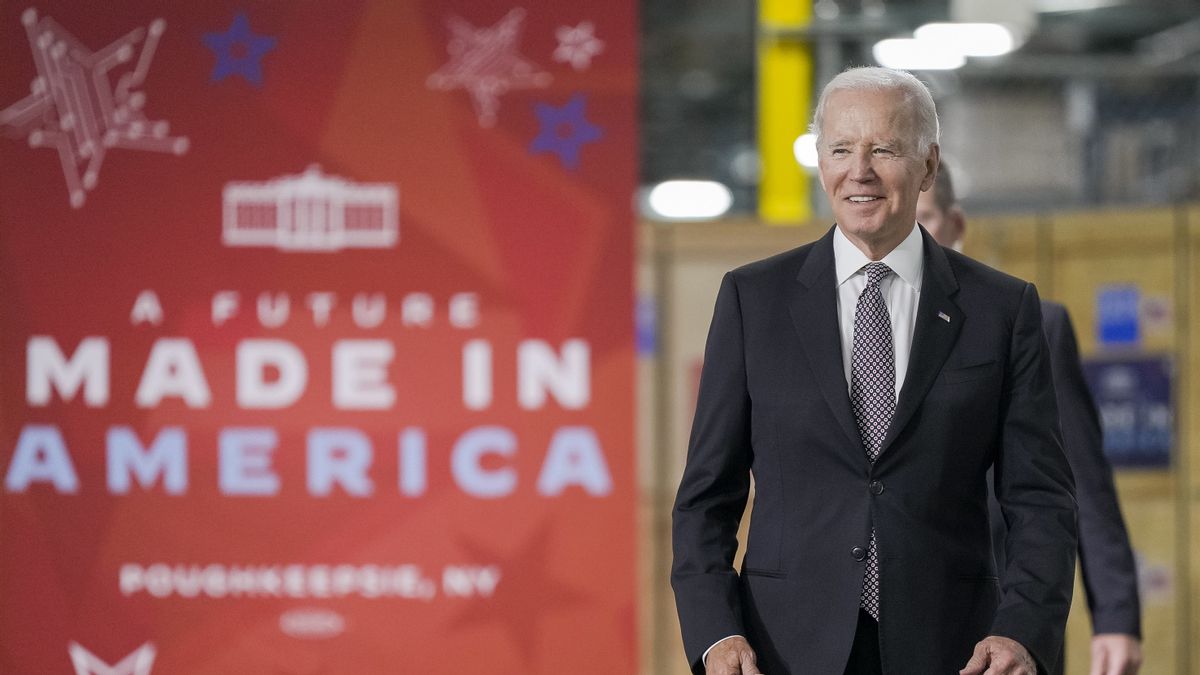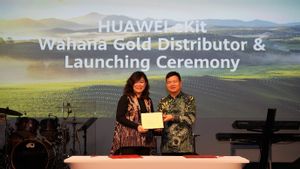JAKARTA – The competition between the United States and China has entered a new phase. This can be seen from President Joe Biden's efforts to limit technological progress being developed by China.
The Joe Biden administration issued a series of export controls on Friday, October 7 including a move to cut China off the supply chain of certain semiconductor chips made anywhere in the world with US equipment. These efforts broaden their reach in an attempt to slow Beijing's technological and military advances.
The rules, some of which take effect immediately, are based on restrictions sent in letters this year to leading appliance makers KLA Corp, Lam Research Corp and Applied Materials Inc, which effectively require them to stop shipping equipment to wholly-owned Chinese factories. manufactures advanced logic chips.
The moves could be the biggest change in US policy on shipping technology to China since the 1990s. If effective, they could cripple China's chip manufacturing industry by forcing American and foreign companies that use US technology to stop their support for some of China's leading chip manufacturers and designers.
“This will set China back from previous years,” said Jim Lewis, a technology and cybersecurity expert at the Center for Strategic and International Studies (CSIS), a Washington D.C.-based think tank. reminiscent of the harsh regulations of the height of the Cold War.
"China is not going to give up on chipmaking but this is really going to slow them down," Lewis told Reuters.
In a briefing with reporters on Thursday, October 6, reviewing the rules, senior government officials said many of the measures were aimed at preventing foreign companies from selling advanced chips to China or supplying Chinese companies with the tools to make their own advanced chips.
However, they acknowledged that they had not received any promise that allied countries would implement similar measures and that discussions with those countries were ongoing.
"We recognize that our unilateral controls will lose their effectiveness over time if other countries don't join us," an official said. "And we risk jeopardizing US technology leadership if foreign competitors are not subject to similar controls."
The expansion of US powers to control exports of chips made with US equipment to China is based on expanding the so-called direct foreign product rule. The rules were previously extended to give the US government authority to control exports of chips made overseas to Chinese telecommunications giant Huawei Technologies Co Ltd and later to stop the flow of semiconductors to Russia after the invasion of Ukraine.
Last Friday, the Biden administration imposed extended restrictions to China's IFLYTEK, Dahua Technology and Megvii Technology, the companies added to the entity list in 2019 over allegations that they aided Beijing in the suppression of the Uyghur minority.
Rules published last Friday also blocked shipments of a variety of chips for use in China's supercomputer systems. The rules define a supercomputer as any system with more than 100 petaflops of computing power in 6,400 square feet of floor space, a definition that two industry sources say could also hit some of the commercial data centers at the Chinese tech giant.
Eric Sayers, a defense policy expert at the American Enterprise Institute, said the move reflected a new bid by the Biden administration to stifle China's advances, rather than simply seek to level the playing field.
"The scope of the rules and their potential impact is pretty amazing, but the devil will certainly be in the implementation details," he added.
SEE ALSO:
The Semiconductor Industry Association, which represents chipmakers, said it was studying the regulations and urged the United States to implement the rules in a targeted manner and work with international partners to help level the playing field.
The new regulations will also severely restrict exports of U.S. equipment to Chinese memory chipmakers and formalize letters sent to Nvidia Corp and Advanced Micro Devices Inc limiting shipments of chips used in supercomputers to China, a system countries around the world rely on to develop. nuclear weapons and other military technology.
Reuters first reported key details of the new restrictions on memory chip makers, including reprieves for foreign companies operating in China and moves to expand restrictions on technology shipments from KLA, Lam, Applied Materials, Nvidia and AMD to China.
South Korea's Ministry of Industry said in a statement on Saturday that there would be no significant disruption to the supply of equipment for the production of existing Samsung (005930.KS) and SK Hynix chips in China.
However, it is necessary to minimize uncertainty through consultation with US export control authorities, he added.
On Saturday, October 8, Chinese foreign ministry spokesman Mao Ning called the move an abuse of trade measures designed to strengthen the United States' "technological hegemony".
The English, Chinese, Japanese, Arabic, and French versions are automatically generated by the AI. So there may still be inaccuracies in translating, please always see Indonesian as our main language. (system supported by DigitalSiber.id)
















